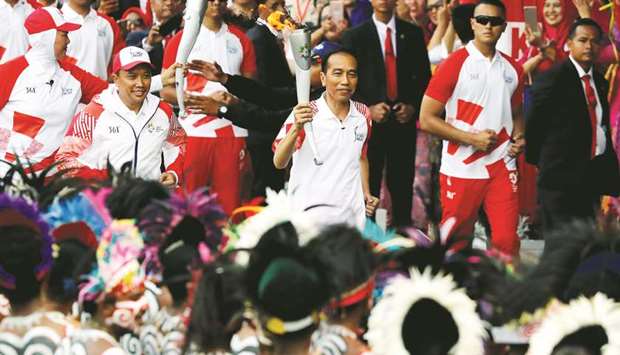The hopes and aspirations of more than 11,000 athletes from 45 countries will be at stake when the curtain rises on the 18th Asian Games in this sprawling metropolis of more than 10 million people.
The latest edition of Asia’s sporting tour de force comes 67 years after the inaugural event in 1951 in New Delhi, where a group of newly-independent nations decided to get together – in a sporting way, of course – to take charge of their own destinies after hundreds of years of exploitative colonialism.
It was a small beginning which saw only 11 countries and 491 athletes take part, but it nevertheless laid the foundations of an energetic movement that gave rise to the global sporting colossuses that China, Japan and South Korea have now become.
China, once derided as the “sick man of Asia”, Japan, a former imperial power and South Korea, which struggled through its initial years because of war and military rule, went on to establish themselves on the global stage as giants not just in sport but in virtually every aspect of human endeavour.
And as yet another edition of the Asian Games kicks off, there is little doubt that China will top the medals chart with South Korea finishing second and Japan holding on to third. A host of other nations – notably India, Iran, Kazakhstan, North Korea and Thailand – would attempt to grab whatever comes their way as they try to cope with the “Big Three” and aim to finish as the “best of the rest”.
Sadly, though, Indonesia are unlikely to make a strong case for this honour, despite being the hosts. This is the first time the Games are being held in two cities – Palembang being the other – but there is little evidence to suggest that the hosts will be a massive beneficiary of that wonderful thing called home advantage.
They had put on a grand show when they first hosted the event in 1962, finishing second to Japan with 21 gold medal medals, but for a variety of reasons since then have failed to build on that success despite its status as the world’s third-largest democracy after India and the US with a population of about 260 million.
A lack of sporting culture and a severe dearth of government-aided development programmes for its young population are the key factors in Indonesia failing to keep up with its much smaller neighbours. This was amply in evidence last year when they finished fifth in the Southeast Asian Games in Kuala Lumpur behind hosts Malaysia, Thailand, Vietnam and Singapore which are significantly smaller in both size and population.
This time though, the hosts have thrown more than 900 athletes into the Games cauldron hoping to make the most out of the situation. It’s the largest number ever from a single country, but although it’s designed to signal intent, it can be also seen as an act of desperation.
With almost $3.5bn budgeted for the event, it’s also something of a prestige issue for the government which is sparing no effort to win over critics.
On Thursday, President Joko Widodo asked Indonesia to “amaze the world” in his state-of-the-nation speech before the House of Representatives.
“After a 56-year wait, this is the second time Indonesia will host the Asian Games, followed by the Asian Para Games,” he said according to the local press.
“In those two events, Indonesia’s sons and daughters will fight to fly the red-and-white flag, compete to sing ‘Indonesia Raya’, and contend to make Indonesia proud. I ask all Indonesians to work together to ensure the success of the Asian Games and Asian Para Games so that we can succeed as host and succeed in (our athletic) performance.”
The People’s Consultative Assembly Speaker Zulkifli Hasan and House Speaker Bambang Soesatyo also spoke of the event in their speeches and the Gita Bahana Nusantara orchestra even performed the 2018 Asian Games theme song, “Meraih Bintang” (Reach the Stars), in the plenary hall during a break in proceedings.
“Let us prove that Indonesia is ready to lift Asia’s position in the world,” President Widodo said in his closing remarks.
Meanwhile, the opening ceremony at the Gelora Bung Karno Stadium is expected to be witnessed by hundreds of millions of spectators around the world.
International renowned Indonesian musicians like Anggun, Raisa, Tulus, Edo Kondologit, Putri Ayu, Fatin, Kamasean and Via Vallen will perform on a spectacular stage, thought to be one of the largest of its kind.
The ceremony stage is 120 metres long and 30 metres wide and will be used by more than 4,000 dancers who will showcase the rich cultural and ethnic diversity of a country of about 18,500 islands of which less than 1,000 are inhabited.
Top choreographers Denny Malik and Eko Supriyanto are in charge of the show. The dancers have been training for months and are expected to put on an energetic display alongside an orchestra involving about a hundred musicians.
An evening of song, dance and camaraderie is a good way to start an event, but for many athletes who have entered the field with no hope of winning a medal, the opening ceremony may be the only moment worth cherishing.

Much
